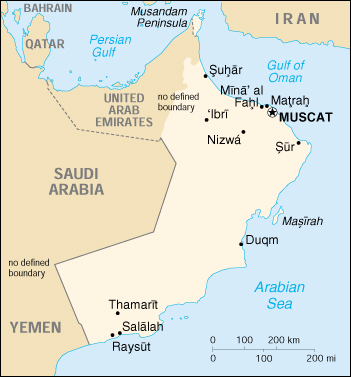

Status Quo Side: Sultanate of Oman (Muscat and Oman)
Non-Status Quo Side: Imamate of Oman
Region: Middle East
Conflict Type: External Intervention
Issues in Dispute: Governance, Resources, Territory
The boundaries of the British-oriented independent Sultanate of Muscat & Oman abutting Saudi Arabia and British-protected Trucial Sheikhdoms near the oil-rich Buraimi Oasis, had been undemarcated and disputed. In October 1955 British-officered Arab troops repelled Saudi Arabian forces in the Buraimi area, and in December 1955 quelled an independence-oriented "conspiracy" at Nizwa, capital of Oman, to the southeast.
The leading Muslim cleric, the Imam of Oman, who had fled, returned to Nizwa in July 1957 with a force said to be armed and backed by Saudi Arabia. On July 22 the UK, responding to Sultan Sa'id bin Taimur's plea for help, warned rebels to leave Nizwa or face air attack.
RAF jets began strafing Omani forts. In early August the air offensive intensified and UK ground forces were sent in. The Imam appealed to the US and USSR and the Arab League to the Bandung powers, to halt UK intervention. Nizwa fell on August 11, and the UNSC rejected the Oman complaint on August 20.
The UK announced that resistance had ceased and withdrawal was proceeding. In 1959 the exiled Imam declared himself President of an independent Republic of Oman and denounced alleged continuing UK occupation and domination. Despite UK denials supported by the UNSYG's representative in 1963, the UNGA, in the anti-colonialist spirit of the times, supported his case.
As nationalist pressures grew, the Sultan's son, Qabus bin Sa'id, seized power in a palace coup. Promising reform and neighborly cooperation, he changed the name to the Sultanate of Oman to emphasize its unity.
In succeeding years Oman reached agreements with Iran to protect its airspace, and with the US which was granted landing rights at a former British air base. In 1981 Qabus joined with the leaders of six neighboring states to form the Gulf Cooperation Council, and also convened a 59-member consultative National Council of appointed members. His Cabinet has consisted of personal aides. There are no political parties. Most opposition elements are represented in the Popular Front for the Liberation of Oman (PFLO)